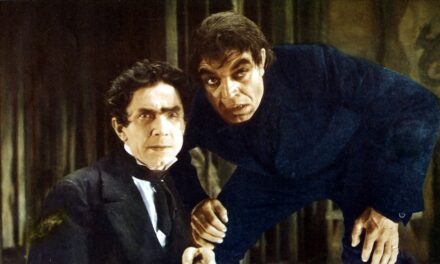We support our Publishers and Content Creators. You can view this story on their website by CLICKING HERE.
 There was a time, not so long ago, when science was perceived to be the enemy of religion or, to put the matter the other way round, that religion was perceived to be the enemy of science. The popular perception was that a choice had to be made. Those who “followed the science” must refuse to follow the teachings of faith; those who “kept the faith” must refuse to accept the teachings of science. The choice was between reason and religion, between the rational and the irrational, between science and superstition. Such a perception was always irrational itself because it presumed that physics explained or explained away metaphysics. Nonetheless, the perception persisted and even prevailed in many circles.
There was a time, not so long ago, when science was perceived to be the enemy of religion or, to put the matter the other way round, that religion was perceived to be the enemy of science. The popular perception was that a choice had to be made. Those who “followed the science” must refuse to follow the teachings of faith; those who “kept the faith” must refuse to accept the teachings of science. The choice was between reason and religion, between the rational and the irrational, between science and superstition. Such a perception was always irrational itself because it presumed that physics explained or explained away metaphysics. Nonetheless, the perception persisted and even prevailed in many circles.
All this is now changing. Recent scientific discoveries are forcing scientists to revisit questions of faith and to question their own questioning of it.
It began with the Big Bang.
The fact that the Big Bang theory was discovered in 1927 by Monsignor Georges Lemaitre, a Catholic priest who was also one of the world’s leading physicists and a colleague of Einstein, should itself give pause for thought. This is how Father Lemaitre describes the Big Bang as the beginning of space and time:
We can compare space-time to an open, conic cup. The bottom of the cup is the origin of atomic disintegration: it is the first instant at the bottom of space-time, the now which has no yesterday because, yesterday, there was no space.[1]
Once Father Lemaitre’s theory was vindicated by other leading physicists, such as Edwin Hubble, it seemed that science had discovered the alpha moment, the moment when the cosmos came into existence, the moment when nothing became something. Needless to say, this close encounter of physics with metaphysics was too close for comfort for those who insist that physics is all that there is. Seeking a “scientific” solution which precluded the existence of the First Cause (God), atheists began to come up with a whole host of imaginative scenarios which aimed at explaining away the Big Bang. These included the finite multiverse hypothesis, the infinite multiverse hypothesis, the bouncing universe hypothesis, the higher-dimensional space universe hypothesis, and the pre-Big Bang eternally static hypothesis. Although each of these ideas extend our view of physical reality into a realm of the imagination beyond our scientifically observable universe, they are all inherently unscientific insofar as none of them is verifiable by the scientific method. They are hypotheses, i.e. works of the imagination, which are unobservable scientifically and therefore unscientific. They are closer to works of science fiction than to science. And the fun of it is that none of these hypotheses avoid the ultimate necessity of a First Cause. They each require a physical, finite beginning. They each require their own equivalent of the Big Bang, even if it’s a different Big Bang. They all require the cosmos being brought into being by an uncaused First Cause (God).
Another inescapable proof for the cosmos having a definite beginning is the second law of thermodynamics, specifically entropy. The fact that the whole of the physical cosmos is subject to entropy means that it cannot have lasted an infinite amount of time, i.e. have no beginning, because the law of entropy would mean that such a universe must have reached thermodynamic equilibrium. For those of us who are not scientists, thermodynamic equilibrium is when energy itself has become de-energized, when there is no longer any flow or movement of matter and energy. In cosmological terms it is physical “death”, after which nothing else can ever happen. In brief and in sum, the second law of thermodynamics necessitates a process by which the cosmos comes to an end, and if it comes to an end in time and space it cannot, ipso facto, be infinite. Once again, all efforts by atheists to explain away the inescapable presence and consequences of entropy are becoming more and more fantastic. They are fantasies which are becoming further and further removed from observable evidence, the scientific method and the discipline of physics. They make great science fiction but are incompatible with scientific fact.
The dilemma that atheists face was encapsulated by the world-renowned physicist, Alexander Vilenkin:
It is said that an argument is what convinces reasonable men and a proof is what it takes to convince even an unreasonable man. With the proof now in place, cosmologists can no longer hide behind the possibility of a past-eternal universe…. There is no escape, they have to face the problem of a cosmic beginning.[2]
Need any more be said? We have proof of the idiocy of atheism straight from the idiomatic horse’s mouth. Those who authentically want to follow the science need to begin to listen to the philosophers because science gives us the reasons to believe the reasons for belief.
The author acknowledges his gratitude and indebtedness to Father Robert Spitzer for his book, Science at the Doorstep to God, for furnishing him with the facts that inform the foregoing. Joseph Pearce discusses Father Spitzer’s book with Father Fessio and Vivian Dudro of Ignatius Press on the FORMED Book Club.
Notes:
[1] Georges Lemaitre, The Primeval Atom (New York: University Press, 1943), p. 133
[2] Alexander Vilenkin, Many Worlds in One: The Search for Other Universes (New York: Hill and Wang, 2007), p. 176
The Imaginative Conservative applies the principle of appreciation to the discussion of culture and politics—we approach dialogue with magnanimity rather than with mere civility. Will you help us remain a refreshing oasis in the increasingly contentious arena of modern discourse? Please consider donating now.
The featured image is “The Scientists” (2007) by Rita Greer, courtesy of Wikimedia Commons. This work is free and may be used by anyone for any purpose.
Share This Story, Choose Your Platform!
Go to Top

 Conservative
Conservative  Search
Search Trending
Trending Current News
Current News 






